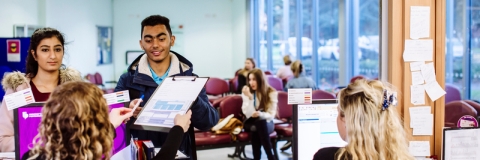
Sidebar navigation

Register for NHS services
It's important to get registered to be able to access local health services
You need to be registered with a local doctor and dentist to access NHS health services when you're at uni.
It's important that you register with a doctor (also known as a General Practitioner or GP) at a GP Surgery and a dentist as soon as you arrive in Portsmouth. Don't wait until you're ill.
Health professionals at GP surgeries like the Practice Nurse can offer help in areas such as contraception, cervical smear tests and flu jabs, and a range of other physical and mental health conditions.
Jump to:
- Getting urgent help from the NHS - who to get in touch with, when
- Register for a GP
- Register for a dentist
- International students' access to the NHS
- Health advice - including vaccinations, sexual health and wellbeing
Getting help from the NHS
Health advice - NHS 111
Call 111 or visit 111.nhs.uk for health advice. It's a free service that allows you to speak to NHS staff who can give you health advice or help find which service is best for you.
Illnesses and minor injuries
The Urgent Treatment Centre and Minor Injury Unit at St Mary's Hospital, east of the University campus can help with minor illnesses and injuries
They can offer treatment, advice and information for incidents like minor head and eye wounds, treating sprains, strains and breaks to arms, lower legs and feet.
Calling an ambulance
If you or someone else has a serious or life-threatening injury or condition on campus, call the Security Lodge for an ambulance on extension 3333 or +44 (0)23 9284 3333. You'll be asked:
- The location, including the area or room in the building
- The phone number you're calling from
- What's happened?
The Security Lodge will call an ambulance and dispatch caretakers and security to assist and arrange access for the ambulance crew. They will call you back to confirm that the ambulance is on its way.
Life threatening emergencies
If you need urgent medical treatment for a life threatening emergency, the local hospital in Portsmouth is Queen Alexandra Hospital ("QA Hospital") in the north of the city.
The Emergency Department at QA Hospital treats those with life-threatening emergencies, such as loss of consciousness, persistent or severe chest pain, breathing difficulties or severe bleeding that cannot be stopped.
Register for a GP
Why register
We recommend that you register with a GP near your term-time address when you come to Portsmouth.
Although you may be spending some of the year elsewhere, such as your family's address over the holidays, it's important that you're able to access Portsmouth health services when you're away from home. For example if you'd like to access local mental health support, you'll often need to be registered with the NHS in Portsmouth.
It's easy to change GPs when you move house or graduate, and your health record will transfer across. It can take several weeks to be processed, so it's best to do it as soon as you move to university rather than waiting until you need help.
How to register
- Choose a surgery that's close to your student house or flat. If you live in University accommodation, ask at the reception of your Halls of Residence for your nearest doctors' surgery.
- Contact a local surgery with your personal details and the name and address of your current doctor.
- If you have an ongoing condition like asthma, diabetes or epilepsy, it's even more important to register with a local GP as soon as possible. Visit the GP for a health check (which is free to new patients), so they know who you are and what medication you're taking.
- Make sure you don't leave your repeat prescriptions to the last minute.
- If you change your term-time address, please contact your GP practice and let them know your new address. If they lose contact with you, you may no longer be registered with your GP.
Accessing health services if you're not registered
If you need urgent health access whether you're at your term time or home address, and you're not registered, you can usually go to any pharmacy or call 111 for advice (see above).
Find a GP
If you live in Southsea, the nearest doctors' surgeries are:
- Uni-City Medical Centre (formerly the University Surgery) 159 – 161 Commercial Road, Portsmouth, PO1 1EA
- Waverley Road Surgery, Craneswater Group Practice, 34-36 Waverley Road, PO5 2PW
- Osborne Practice Surgery, Trafalgar Medical Group Practice, 25 Osborne Road, PO5 3LR
- Salisbury Road Surgery, Craneswater Group Practice, Salisbury Road, PO4 9QX
- Devonshire Avenue Surgery, Lighthouse Group Practice, 262 Devonshire Avenue, PO4 9EH
- Sunnyside Medical Centre, 8F The Pompey Centre, Fratton Way, PO4 8TA
- East Shore Partnership, St Cuthbert’s Church, Hayling Avenue, PO3 6BH
- Heyward Road Surgery, 3 Heyward Road, PO4 0DY
- Somerstown Health Centre, Somerstown Central Community Hub, Tyseley Road, PO5 4EZ
- Southsea Medical Centre, Lighthouse Group Practice, Carlisle Road, PO5 1AT
If you live in Central Portsmouth, North Portsmouth, or Cosham, the nearest doctors' surgeries are:
- Lake Road Practice, Nutfield Place, Portsmouth, PO1 4JT
- Cosham Health Centre, Vectis Way, Cosham, PO6 3AW
- Kingston Crescent Surgery, 92 Kingston Crescent, North End, Portsmouth, PO2 8AL
- Derby Road Surgery, 27/29 Derby Road, North End, Portsmouth, PO2 8HW
- Portsdown Group Practice, Crookhorn Lane, Purbrook , Waterlooville, PO7 5XP
- Drayton Surgery, 280 Havant Rd, Drayton, Portsmouth, PO6 1PA
Search for a GP via the NHS
Help with prescription costs
If you're on a low income, you may be able to get help for your NHS costs through the NHS Low Income Scheme.
Register with a dentist
It can be difficult to find a place at a dentist as they are in high demand - but you can search for nearby dentists on the NHS website. You should contact your dentist immediately if you need emergency treatment due to symptoms such as
- Severe pain that cannot be controlled with pain relief
- Swelling in the mouth or face (with or without pain)
- Uncontrollable bleeding in the mouth
- Any trauma to the mouth or teeth
If you don't have a regular dentist then contact NHS 111 by phoning 111. They can advise about emergency appointments close to you.
International students' access to NHS services
If you join us on a Student Route visa for a full-time course or part-time postgraduate course for more than 6 months, you will be subject to the Immigration Health Surcharge of £470 per year, , this will increase to £776 per year from January 2024, payable with your visa application. This helps cover your NHS costs while you're in the UK, so you can access NHS services whenever you need them.
If you have any dependants living permanently with you for the duration of your course, they must also pay the surcharge when they apply for their visa. You'll all need to pay any additional statutory NHS charges, like any prescriptions.
Read more guidance on how to access NHS services as an international student.
Health advice

Safe sexual relationships at uni
Understand more about positive, healthy, consensual sex before moving away from home and starting university.

